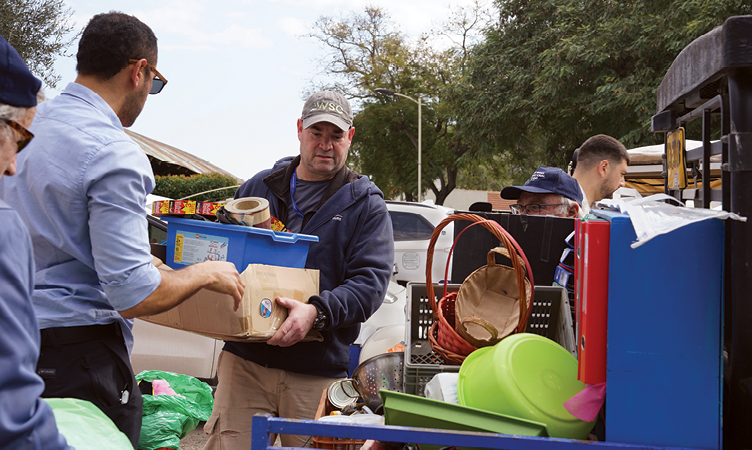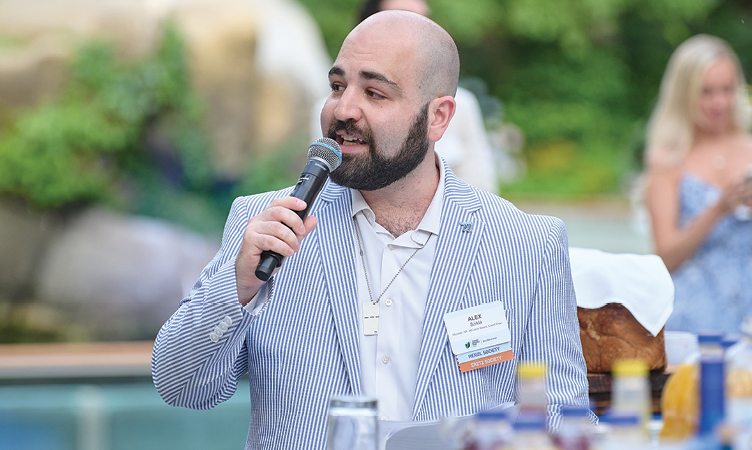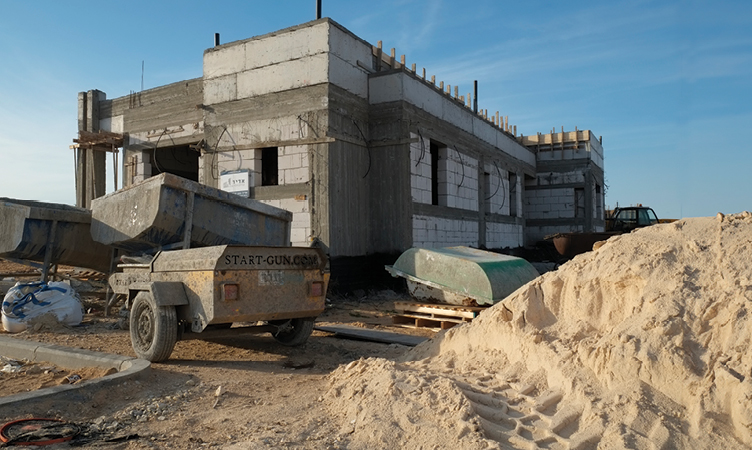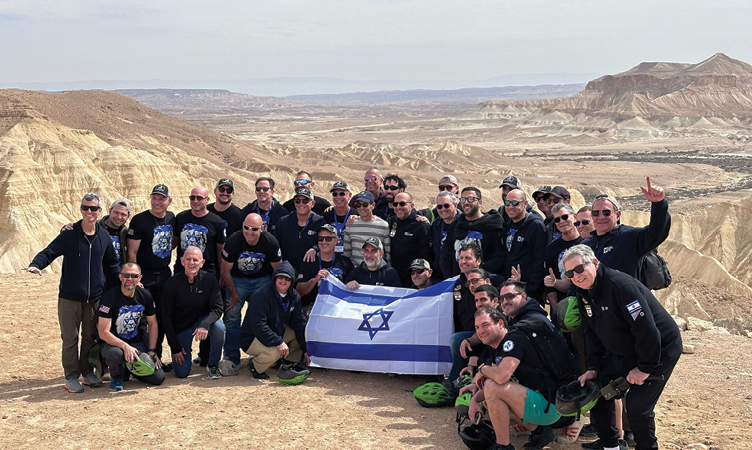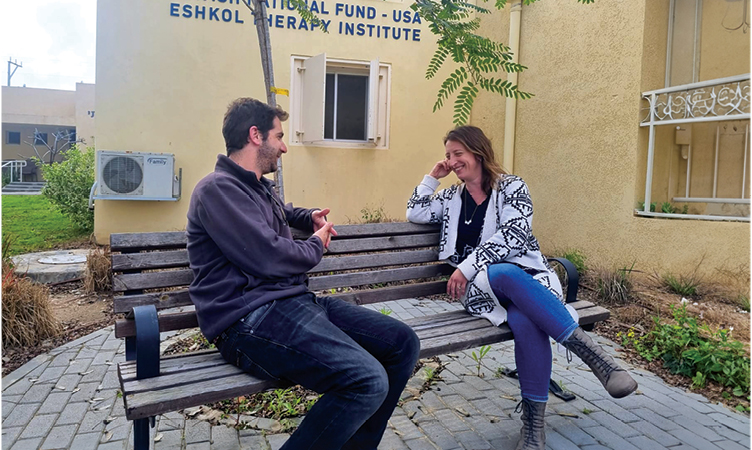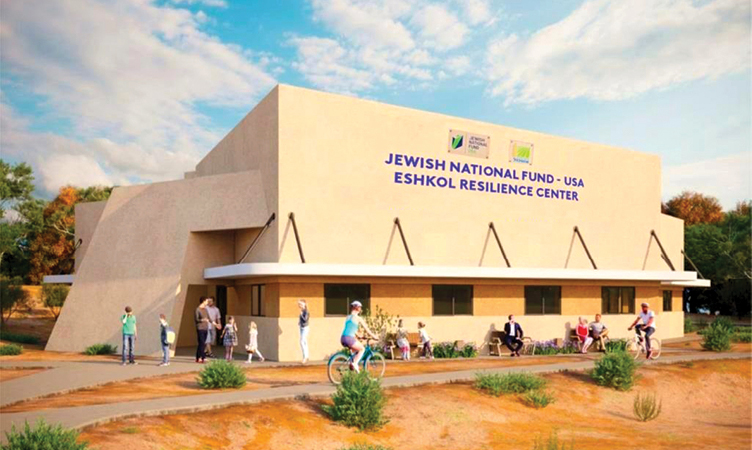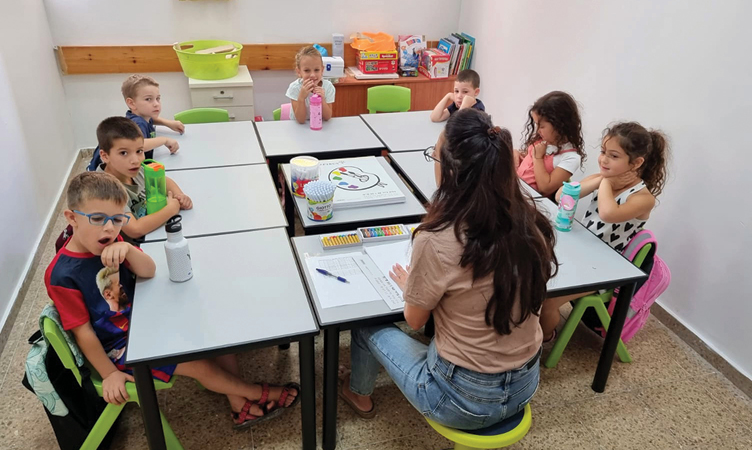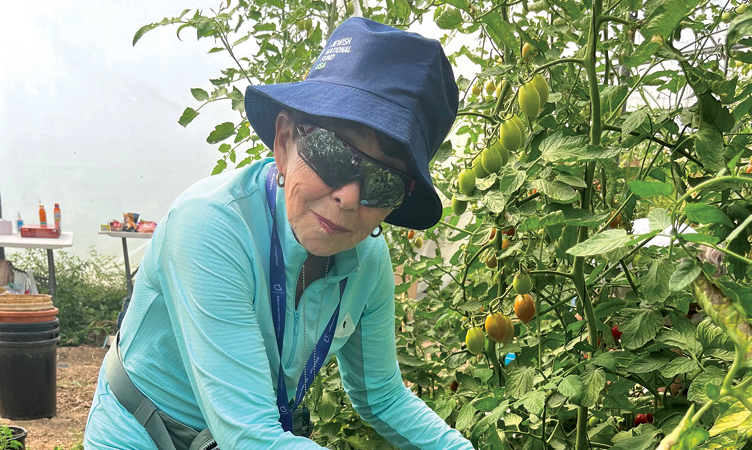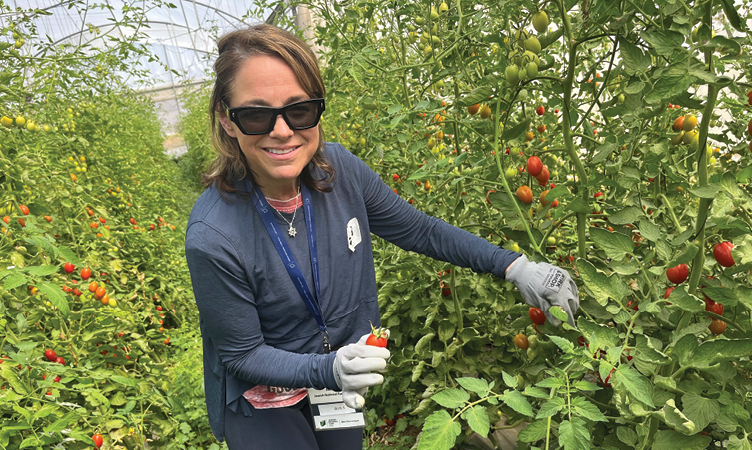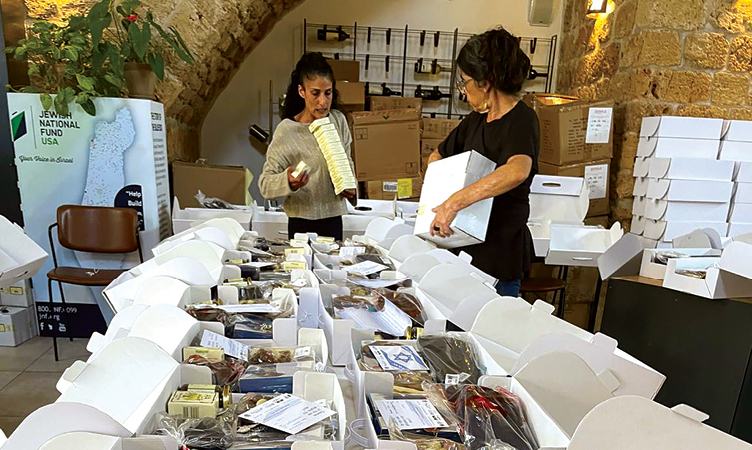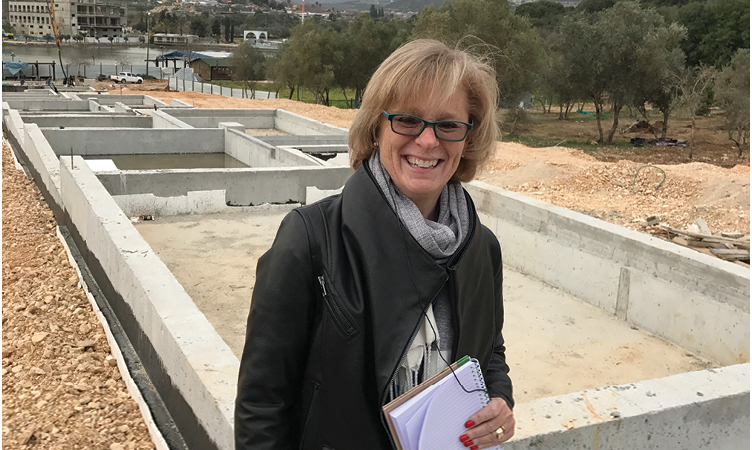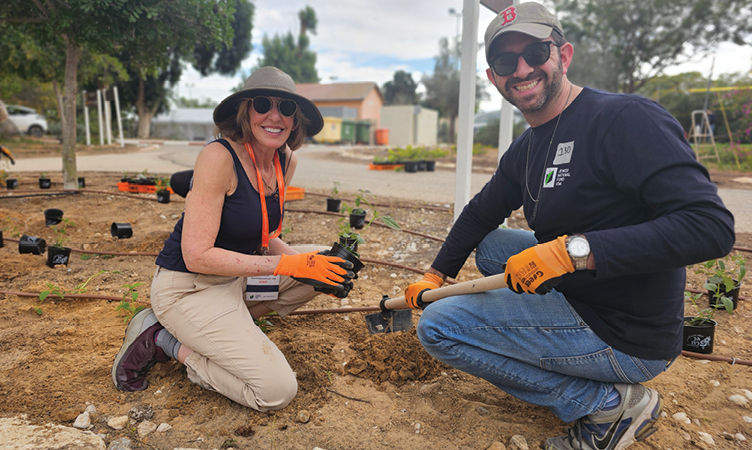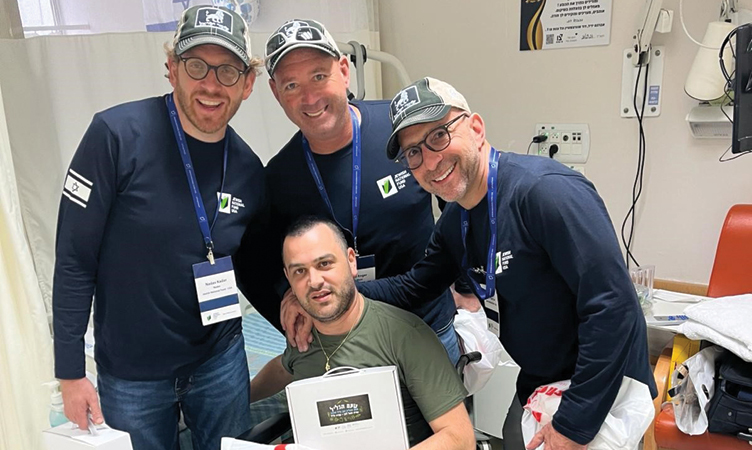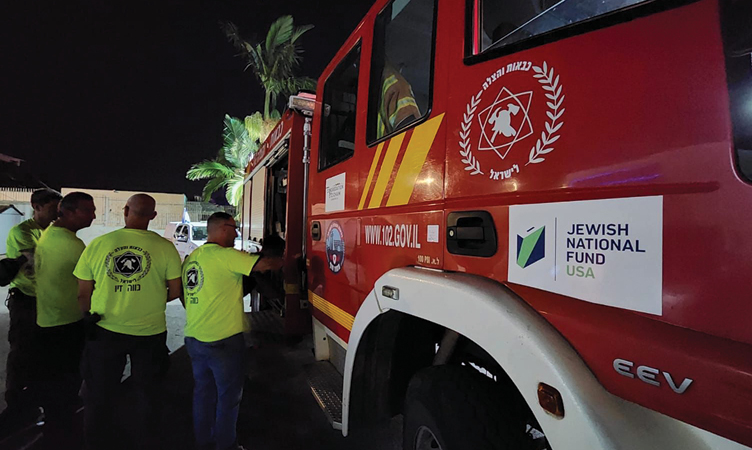The magnitude of the devastation that October 7 left in its wake is hard to quantify—death, kidnapped civilians and IDF soldiers, displaced families, ravaged communities, struggling businesses, and an entire society psychologically reeling are just the tip of the iceberg. The circle of pain will be with us for a generation or more.
Jewish National Fund-USA has been on the ground, partnering with the people of Israel since day one. We are committed to addressing the needs of each community as they heal and rebuild. Over the past year, tens of thousands of Jewish National Fund-USA supporters have extended themselves as part of these efforts—through generous philanthropic support, advocacy work, fundraising, and by traveling to Israel on volunteer missions. The people of Israel know us, and we consider them our family. Our donors have chosen to invest their time, money, and energy with Jewish National Fund-USA because they believe in the future of the people of Israel, and they know the future is bright. Each of us has a role in building that future and we hope that you will join us.
Undeterred Resolve
Ever since the war erupted, northern Israel has been bombarded with daily rocket attacks, forcing mass evacuations. Despite the danger, Jewish National Fund-USA has pressed on with the construction of the new Robert and Gale C. Kares Kiryat Shmona Medical Center and Jentezen Franklin Emergency Center, even under fire. The growing number of war casualties highlighted the urgent need to complete this state-of-the-art medical and emergency center, which will serve the city’s 22,000 residents and thousands more in the region.
“Even during these challenging times, we must focus on the region’s future. The situation makes progress sporadic and difficult. But we will continue to build. We must continue to build. This is a basic and vital need for the residents of the north,” said Alon Badihi, Jewish National Fund-USA’s Executive Director in Israel.
Jewish National Fund-USA has long supported Israel’s regional healthcare needs in the north and south, having created a network of medical centers and resilience facilities catering to those living outside the center of the country. While Kiryat Shmona’s civilian population has largely been evacuated, tens of thousands remain in the surrounding areas, including in the town of Majdal Shams, where a rocket from Lebanon tragically killed at least 12 children this summer. Many of the injured had to be transported to a hospital in Haifa instead of being treated closer to home.
The new medical and emergency center’s strategic location will connect the older center of the city to new neighborhoods and communities in the northern Golan and Upper Galilee. Once completed, it will provide 24/7 medical services, clinics, emergency care and other essential healthcare services, matching those available in central Israel.
The medical and emergency center is a strategic initiative that is part of Jewish National Fund-USA’s overall vision to attract 300,000 new residents to northern Israel. This will help strengthen existing communities and advance population growth, a plan that has seen great strides over the last decade. Jewish National Fund-USA’s “Reimagine” plan, formulated after October 7, is an extension of that vision and prioritizes security, rebuilding damaged houses and facilities, bringing families back home, and enhancing health services, employment opportunities, and agriculture. It also includes new tourism initiatives and continuing to establish the region as a hub for the foodtech industry.
“We are as committed as ever to our partnership with all of the people of the Galilee,” said Sheryl Buchholtz, Chair of the Go North East Task Force. “We understand that if you want to move to Kiryat Shmona, you must have a place where your child can go for a cough or you can have emergency surgery. Whether you are returning home or relocating here, Jewish National Fund-USA will be here to welcome you home. And we will be part of your family for years to come.”
On Deck: Dr. Steven Katz
As Chief of the Department of Emergency Medicine at Memorial Hospital West in South Florida, Dr. Steven H. Katz is no stranger to crisis situations. So, in the aftermath of October 7, he knew he needed to go to Israel and help in any capacity he could.
“I felt this compulsion to go,” he said. “But I had nothing organized. I had no plan.”
Despite a lack of concrete details and no previous experience leading such a trip, he began recruiting friends for the trip, including co-workers at his hospital. If people were interested but had questions about what the exact itinerary would entail, Steven told them to have faith it would all come together.
“I said, ‘Don’t worry! If you need to know, you’re the wrong guy for the trip. You’ll know when we get there,’” he recalls.
Partnering with Jewish National Fund-USA, Katz led a total of 38 men on what would become the inaugural Brotherhood Mission to Israel, supporting communities impacted by the October 7 attacks and raising over $1 million in the process. The group included 25 physicians, as well as lawyers, business owners, insurance and real estate professionals, a school safety advocate, and a general contractor. And while many of the people on the trip were from Southern Florida, it also attracted men from New York, Missouri, and even one from Puerto Rico.
Each participant had a $5,900 fundraising minimum to join the mission, yet each far exceeded that goal. “Every dollar raised is being left in the land of Israel,” Katz said.
The men visited a moshav (co-op community) that was targeted during Hamas’ attack, and provided $175,000 toward a new daycare center while laying a cornerstone for the new facility. They partnered with local Jewish National Fund-USA-supported volunteer organizations to plant zucchini on a farm —essential work that required help from volunteers because of the labor shortage, and helped prevent a food crisis (for more on this volunteer organization’s work, see page 6). In the Gaza border community of Shlomit, they welcomed home one of the first groups of evacuees to return since October 7.
The group also visited the site of the Nova music festival massacre, met with Israeli President Isaac Herzog, and hosted a barbecue for Israel Defense Forces (IDF) soldiers. One of the trip’s highlights was helping to sponsor a large multi-family wedding for 10 IDF soldiers who were married at the same time, under 10 different chuppahs, attended by 2,000 people. In their hotel in the south, they threw a pizza party for displaced people from the north.
The Second Annual Brotherhood Mission is already scheduled for February 26—March 4, 2025 (https://www.jnf.org/brotherhoodmission). Katz and his co-chair and friend Mark Cantor of St. Louis have high hopes, aiming to recruit twice as many participants and raise over $2 million.
When asked why the mission was so successful, Katz didn’t hesitate. “Our agenda was incredibly simple,” he said. “Number one, acts of loving kindness and brotherly love to our brothers and sisters in Israel. And number two, to raise as much money as possible. The bottom line: we are one people. We are all in this together.”
Addressing Mental Health Needs
Even before October 7, many people in Israel’s southern region needed emotional therapy because of the thousands of rocket attacks on their homes and communities since 2005; the recent brutal attacks have taken the scale of trauma and suffering to a whole new level. With the situation still ongoing, it’s tough to gauge how many more people need mental health services; estimates show the numbers have risen more than 460%. Communities are returning to their homes in the Israel Envelope, yet their reality is nothing like it was before October 7.
Jewish National Fund-USA has long provided resilience and emotional therapy and support to individuals and families living in the region, from the International Resilience Center and Animal Therapy Park in Sderot to the Psychological Center in Sha’ar HaNegev. Yet after October 7 it soon became clear that much more is needed to help a population that is shell-shocked and traumatized. Almost everyone knows someone who died, was severely injured, or was taken hostage on that fateful day. The events have impacted every segment of the population: families coming home, returning soldiers coming back from horrific scenes on the battlefield, traumatized kids, and seniors uprooted from their familiar surroundings. This is why we are constantly working with community and regional leaders to understand their ever-changing needs.
The Eshkol Resilience Center serves the Western Negev, made up of 17,500 residents. Established in 2008 with the support of Jewish National Fund-USA, and surrounded by a beautiful garden funded by Hadassah, the center typically treated around 1,000 children, youth, and adults each year through multiple therapies. Carey-Lee Tal, resource coordinator for the Eshkol region, says that in their new post-October 7 world, the center is incredibly “backlogged.” Therapy tents have been set up outside some of the emergency centers and hotels where communities have been evacuated, and the population is being treated as best as possible, but there is clearly a need for a longer-term solution.
“Jewish National Fund-USA is working to improve outcomes for the entire community—from children through the elderly—by expanding the Eshkol Resilience Center,” said Carey-Lee. “It’s the only way to meet the growing needs of the region.”
The new, expanded resilience center will allow it to grow its services and reach more of the affected population, whether they are still evacuated or have returned home. The center aims to build on traditional one-on-one therapy sessions to include group therapy, family counseling, and animal-assisted, art, and movement therapy.
For Shahar Roitman, spokesperson for the Eshkol region and mom of three, things are very clear-cut. “I know that if I wasn’t getting therapy, and my kids weren’t getting therapy, there’s no way we’d be able to keep living in this area,” she said. “I know that if everyone else around me wasn’t getting treatment, no one would be living here. It would become abandoned. The Israel Envelope would become a ghost town. Therapy builds resilience. Therapy saves lives.”
On Deck: Linda and Bonnie Platt
When Linda Platt and her daughter-in-law Bonnie Platt of Minneapolis went on a Jewish National Fund-USA volunteer mission in May, they were taken aback by the reality of life in this area. “One of the key takeaways was realizing how close Gaza is to the Otef [Israel Envelope],” Bonnie remarked. “It’s so close that its distance isn’t measured in miles or kilometers, but how many seconds to get to the bomb shelter. 15 seconds. Children can’t play outside because 15 seconds isn’t enough time to reach safety.”
“I didn’t know much about Jewish National Fund-USA prior to the trip,” Linda said. “I wanted to visit Israel and contribute, and Jewish National Fund-USA provided that opportunity.” Bonnie adds that, as a second-generation Holocaust survivor, she felt compelled to bear witness to this modern atrocity. (Jewish National-Fund USA is the only organization offering volunteer trips almost every week—sign up now at jnf.org/travel.)
The volunteer mission was an eye-opener for Linda and Bonnie. They were moved and inspired by what they saw as they spent four jam-packed days working hard with their fellow volunteers. In meeting Israelis from all walks of life, Bonnie said that she observed the dissonance in everyday life in Israel. “A casual observer in Tel Aviv wouldn’t know there’s a war going on, but everyone who lives there knows someone—a soldier, a victim, an evacuee. Everybody has PTSD and is suffering one way or another.”
Linda and Bonnie returned to Minneapolis with a strong desire to share what they saw. “I took extensive notes and people asked to hear about my experiences,” Linda explained. “So we invited some friends over, converted my notes and our pictures into a presentation, and hooked up a big screen TV. We had 30 attendees the first time. People had lots of questions and were really interested.”
“When we first decided to present to an audience of friends, the response was huge,” Bonnie remarked. “They were shocked, inspired, teary-eyed. They were so unaware of what was going on in Israel—both on October 7 in particular and the ongoing situation.”
Following their first presentation, Linda and Bonnie were approached by more people who were interested in hearing about their experiences in Israel—a senior citizens home, a church, more friends. “We’ve already done six presentations,” Linda said. “We’ve brought awareness to people from different backgrounds.
Many of their listeners are non-affiliated Jews, are not Jewish, or have never been to Israel, and their only knowledge of Israel comes from the media.
“People are surprised that they didn’t know what was going on,” Bonnie said. “They don’t know who Hamas is, that they’re a terrorist organization. We live in middle America here in Minnesota; there are not a lot of Jews here. So people felt thankful to be informed about the real Israel, by people like us who have spent time on the ground, not the bits and pieces they see on the news.”
Linda and Bonnie continue to receive requests to speak and they plan to keep going. “More groups have reached out to us, and the audiences keep growing,” Linda said. “We’ll be looking to rent a space to accommodate everybody for the next event.”
It’s a rewarding experience for them both. “We feel good about educating others,” Bonnie said, “both non-Jews and Jews who don’t have much of a background, and especially young people. We’re looking forward to talking to more young people.”
Bolstering Businesses in the North
Jewish National Fund-USA has been working with communities in the north to increase employment and develop economic opportunities, and has created a small business association, which is the heart and soul of the region. Together, the Lauder Employment Center and our small business association serve as economic engines, sources of innovation, and vital contributors to the local culture.
As part of our Go North strategic initiative, Jewish National Fund-USA opened the Lauder Employment Center in Akko to promote high-quality employment in the Galilee. Now, with much of the population in the north displaced, Jewish National Fund-USA and the Lauder Employment Center are working to assist Israeli business owners during this unprecedented period.
The small business association—a consortium of local entrepreneurs and tour operators based in Israel’s northern region—has given business owners the opportunity to sell their handmade goods, crafts, and food products online via Jewish National Fund-USA’s Mitzvah Marketplace, thus providing a much-needed revenue stream and financial lifeline.
The Mitzvah Marketplace also gives shoppers the opportunity to send a care package to a soldier on the front lines or an evacuated family. Anyone can send a package and know that it is getting into the hands of a grateful soldier—donors don’t need to have a specific soldier’s name. Each recipient receives a curated collection of goods and every purchase simultaneously supports local businesses. According to Michal Shiloah Galnoor who oversees the small business association, 5,000 packages have been sold over the web-based marketplace, amounting to around 1 million NIS in sales. As a result, staff members have been busy packing and mailing packages. Moreover, it sends a message to the recipients that they are not alone.
“In the north we’re really in limbo, because no one knows what’s going to happen and it’s very hard to operate any business right now,” Galnoor said. “October 7 and the war have tested the strength and resilience of our small business community. We have to be very creative, very flexible.” To date, 157 businesses have been able to remain open thanks to these efforts.
Other small business association members who don’t sell physical products—including tour guides, dance instructors and theater performers—are conducting fun and engaging activities for evacuees, thus providing them with income during these trying times that helps offset the hardships of the war. “They earned some income, and evacuees were given a break from their daily challenges,” Galnoor told B’yachad. “It was a win-win situation.”
Additionally, online and in-person workshops have provided professional development opportunities and the chance for members, most of whom had been evacuated, to examine ways of growing their businesses. These workshops covered marketing strategies during unusual times, exploring new markets, and the effective utilization of accounting services and cost-saving measures. “These workshops allowed professionals to pick up some new tools and leave with a bit of optimism,” Galnoor said. “They showed how Israelis have the capacity to thrive even in a crisis.”
On Deck: Incoming Jewish National Fund-USA President Deb Zaluda
Fortunately, a crisis doesn’t scare incoming Jewish National Fund President Deb Zaluda of Chicago, who was visiting her daughter in central Israel on October 7. While others were fleeing, Deb decided to stay. “There was no way I was leaving,” she said. “And I’ve been back several times since then.”
Deb first took on a leadership role with Jewish National Fund-USA when she joined the Illinois Board in 2012. She soon became President of the Chicago Board and then Chairman a few years afterward.
“I saw what Jewish National Fund-USA was doing and the impact they were having in more expansive projects. I wanted in. I wanted to help Israel,” she recalls.
Deb chairs the Go North West task force, focusing on increasing employment opportunities through entrepreneurship in the Western Galilee. If the threat of an all-out-war couldn’t deter her, then neither will the challenge of revitalizing the north.
When Jewish National Fund-USA originally started their Go North task force, the vision was to develop the area through economic development and tourism. After October 7, the task force expanded its scope to assist residents in the north who were forced to evacuate their homes. This includes helping them relocate their businesses or finding them work where they are now, and determining how to get them jobs when they move back. “Employment is one of the biggest barriers to moving up north,” Deb explained. “We need to ensure that more people move there, but also that younger people who grew up there stay there.”
The task force also launched a “Reality to Reimagine Caravan” as part of Jewish National Fund-USA’s Reimagine plan for the north. Diverse groups, including Druze, Muslims, Jews, and Christians, have been spending time in the United States, speaking in communities across the country—to the people and the media—to share their stories and bring attention to their collective goal of revitalizing the north.
“Our plan is to highlight the shared society that has always made the north so special, to educate the public about their suffering and today’s reality,” Deb said. “The reality today is that we must restart and reimagine northern Israel as populations are evacuating, and their story goes untold. We need to focus attention on the issues facing the north. We were there yesterday, we are there today, and we must show the people of the north that we believe in tomorrow.”
Prioritizing Security
Survivors of the October 7 massacre share a common message: “We felt helpless. We felt unprotected. We needed help and nobody came.” The events of that day took everyone by surprise, and security forces couldn’t reach all the kibbutzim and moshavim in time. However, communities with organized and well-equipped civil defense teams managed to protect their residents and prevent widespread casualties.
For over a decade, Jewish National Fund-USA has invested in fire and civil defense across Israel, equipping security forces, firefighters, rescue teams, and volunteers and ensuring they are well-trained. Before October 7, Jewish National Fund-USA recognized the importance of swift and effective fire safety and civil defense teams for Israel’s security. Now, with the war ongoing, Jewish National Fund-USA prioritizes equipping these teams with state-of-the-art gear such as drones, rescue tools, protective gear, and breathing apparatus, enabling these local heroes to perform their duties safely and bring security to their communities.
“Before October 7, Jewish National Fund-USA provided us with bullet-proof vests, camera equipment, and off-road vehicles,” explained a member of the security team in Shlomit, a community in the Eshkol region. “On October 7, we used this equipment to rescue neighboring villages. We rushed to Pri Gan and saved the moshav from a sure massacre. Not one of the 250 residents was hurt that day.” Tragically, four members of Shlomit’s security team were killed.
Since 2006, Jewish National Fund-USA has raised over $20 million to support Israel’s rescue teams and firefighters and has provided over 200 fire trucks and 100 fire wagons. However, the equipment alone was insufficient to combat the multitude of fires caused by mortar fire in northern Israel from Hezbollah rockets in the latest conflict.
The men and women of Israel’s civil defense and firefighting sector brave soaring temperatures to extinguish numerous fires each week owing to attacks by Hezbollah, without the backup of aerial water bombers. Thanks to Jewish National Fund-USA, nearly 20 new fire trucks at a cost of $250,000 each have been commissioned since the war began, protecting the Israel Envelope on the border with Gaza, the Negev, and the Galilee.
Jewish National Fund-USA champions the Emergency Response Center model, which relies on collaboration between security, fire and rescue, and medical teams for swift and effective responses. Key features include a regional command center, rapid response vehicles, medical care, drone operations, search and rescue, and training. These centers, which each cost $1.5 million, have proven effective in Southern Eshkol, Ramat HaNegev, and the Central Arava in Israel’s south. Following October 7, Jewish National Fund-USA has planned eight new centers for the Israel Envelope, equipped to enhance security and to convey the message to the communities there that they are not alone.
On Deck: Tamar Shapiro
For many Americans, life in the communities in the Israel Envelope can feel abstract. But Tamar Shapiro, a 13-year-old from New Jersey, has been there.
In 2022, Tamar’s sister Vered and her cousin Maddie raised over $13,000 for their bat mitzvah project to beautify bomb shelters in the southern communities of Ashkelon and Nitzan. Tamar’s parents, Rena and Adam, remember that both girls were very eager to partner with Jewish National Fund-USA to make a difference in the lives of Israeli families, specifically in the south. “Hearing that the beautification of the shelters helped to alleviate some of the stress, especially among young people, hooked them right away,” Adam recalls. “They initially set out to raise enough funds for one shelter and quickly exceeded that goal.”
The Shapiro family visited the region at the culmination of their project. Tamar and her siblings spent time getting to know the people living in those communities and learning about why they choose to live in this remote part of Israel, a region under constant threat. “The people we met told us that it was worth it to live in these areas because life was so wonderful and filled with friends and incredible support from all over the world,” she says. “The kids that we met in Nitzan were super excited to show off their newly decorated bomb shelter and let us know how much they appreciated it.”
In addition to the bomb shelters, the Shapiro family also saw other aspects of the region’s infrastructure that were designed to bring normalcy to the children in the area. “In Magen, which is next to Nir Oz, we visited the GrooveTech building that Jewish National Fund-USA built,” she said. “This space was built in such a way that if the rocket sirens go off during or after school, the students have a safe and fun place to go. I loved playing soccer on the safe room floor, using the virtual reality system with the special headsets, visiting the planetarium, building on the enormous Lego wall, experiencing the arcade center, and so much more.”
When these communities were attacked on October 7, it felt personal to Tamar. “I knew I had to do something for all of these wonderful people who I had met just the previous year,” she says. “I think it’s really important for young people to advocate for Israel because the world needs to hear our opinions and voices, especially after October 7.”
She encouraged her friends and family to support Jewish National Fund-USA’s Israel Resilience Campaign by setting up her own fundraising page, which raised almost $17,000. In late October, she was a featured speaker at a Jewish National Fund-USA solidarity event in Livingston, New Jersey, where she addressed a crowd of over 200 people.
Tamar says that this experience has empowered her to take her place as a Jewish leader—even while she is still in middle school. “Completing my project and speaking about it to different audiences showed me that I’m not too young to make a difference, and I hope that others my age can understand that you are never too young to make a difference,” she says. “I saw that people were excited to see me up on stage speaking and then really wanted to help. Raising money is about convincing others about why your project is important and if you really care about something, convincing others to do the same shouldn’t be that hard!”
Stronger Communities, Stronger Bonds
According to Talia Tzour Avner, Jewish National Fund-USA’s Chief of Staff in Israel, the two most important words when it comes to rebuilding the communities in the south and in the north are “trust” and “hope.”
“The word trust is very meaningful in times of emergency and in times of chaos,” she said. “Not only did the people in these communities not lose trust in Jewish National Fund-USA after October 7, but they trust us even more.” The organization has spent decades creating meaningful relationships with the people in these communities. “We were there before, we were there on October 7—helping them to evacuate and helping the communities that absorbed them by providing them with the funds and equipment that they needed—and we’ll be there on the ground when they’re ready to come home.”
In the meantime, in Israel’s north and south, Jewish National Fund-USA understands the importance of keeping people from the same community together while evacuated from their homes. “Whether it’s a kibbutz or a moshav or a small town—they asked to stay together,” Talia said. “They said, ‘We lost people. We have people who are wounded. We experienced the most traumatic experience of our lives. If we need to heal from the disaster, we want to do it as a community.’”
The second word, “hope,” is what Jewish National Fund-USA brings to these communities as they persevere with the efforts to rebuild. “You hardly see public figures coming to the area, but you do see Jewish National Fund-USA professionals, including the contractors coming to construct a new resilience center or to build the new sports complex in Sha’ar HaNagev,” Talia says. But what makes the biggest impression is when Jewish National Fund-USA volunteer missions arrive. “You have missions full of Zionists—not all of them are even Jewish—that come and give you a hand because they believe that this is what should be done and the future is important,” she says, emphasizing the disbelief that residents feel when they meet the volunteers.
“To have Americans choosing to come to a war zone and work when it is over 100 degrees, and to do whatever they’re asked because they feel that they are partners and they’re part of the future of Israel—it shows them that there are people who see us, who care for us. You strengthen the hope they have in their hearts. People still have hope. Otherwise, why would they move back to the communities? Why would they stay in Israel? Why would they believe in a better future? It is because of the people of Jewish National Fund-USA, who also believe in the future of the region and the future of these communities.”
On Deck: Alex Szikla
For Alex Szikla, it was the community he found within Jewish National Fund-USA that made him want to become more involved. “I found a group of dedicated, intelligent, and successful individuals who were dedicated to the land and people of Israel,” he said. Alex, a 32-year-old real estate investor, investment sales advisor, and investment banker in New York City, had always been involved across various Jewish philanthropies. But after the pandemic, he found himself looking for something more.
“I really saw the need for a community,” recalls Alex, who soon joined the board of JNFuture in New York City. “I’m a great lover of Israel and I think that the work that Jewish National Fund-USA does is truly impactful.”
Alex first began traveling to Israel with his family as a child. In speaking with him, it’s clear that he feels a tight-knit connection with the people of Israel, and a personal responsibility to treat Israelis as part of his own extended community. On October 7, Alex sprang into action as soon as he heard about the attacks in Israel and made arrangements to house Americans who needed a place to stay for a few days until they could return home. He also helped arrange housing for a displaced family from the Israel Envelope.
“It’s an important time to be there for the Israelis who are on the front lines and for global Jewry,” Alex emphasized. To provide even more support, he created his own fundraising page for Jewish National Fund-USA’s Resilience Campaign, raising thousands of dollars within just a few days, which he then matched with his own gift.
In June, Alex co-chaired the JNFuture Shabbat in the Park, which was said to be the largest gathering of Jewish young professionals in New York City, with more than 500 people in attendance including survivors from Kibbutz Be’eri. Alex believes that the rise in antisemitism locally and abroad has galvanized his peers and spurred many into action for the first time. “It has been incredible to see how people have been falling over themselves in the aftermath of October 7 to get involved in some way,” he said. “Whether that is through advocacy, preparing care packages for troops, or phone banking to raise money—the vast majority of the Jewish population found a way to lend a hand.”
Alex says that the unity that has been catalyzed as a result of October 7—among Israelis, among American Jews, and among Zionists around the world—gives him hope. “Now is the time—across the spectrum of Jewish denominations—where we really need to take seriously the ‘never again is now’ sentiment,” he said. “Regardless of your level of religiosity or the degree of one’s direct ties to Israel, Jewish National Fund-USA gives everyone the opportunity to display their talents and leadership.”

